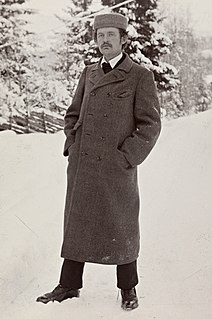A Quote by Benjamin Franklin
He that steals the old man's supper does him no wrong.
Related Quotes
I believe what really happens in history is this: the old man is always wrong; and the young people are always wrong about what is wrong with him. The practical form it takes is this: that, while the old man may stand by some stupid custom, the young man always attacks it with some theory that turns out to be equally stupid.
What we suffer from today is humility in the wrong place...The old humility was a spur that prevented a man from stopping; not a nail in his boot that prevented him from going on. For the old humility made a man doubtful about his efforts, which made him work harder. But the new humility makes a man doubtful about his aims, which will make him stop working altogether.
A bath in Ganges undoubtedly absolves one of all sins; but what does that avail? They say that the sins perch on trees along the banks of the Ganges. No sooner does the man come back from the holy waters that the old sins jump on his shoulders from the trees. The same old sins take possession of him again. He is hardly out of the waters before they fall upon him.
Good name in man and woman, dear my lord, Is the immediate jewel of their souls: Who steals my purse steals trash; ’tis something, nothing; ’twas mine, ’tis his, and has been slave to thousands; But he that filches from me my good name Robs me of that which not enriches him, And makes me poor indeed.
In northwest Alaska, kunlangeta "might be applied to a man who, for example, repeatedly lies and cheats and steals things and does not go hunting, and, when the other men are out of the village, takes sexual advantage of many women." The Inuits tacitly assume that kunlangeta is irremediable. And so, according to Murphy, the traditional Inuit approach to such a man was to insist he go hunting, and then, in the absence of witnesses, push him off the edge of the ice.
No one punishes the evil-doer under the notion, or for the reason, that he has done wrong -- only the unreasonable fury of a beast acts in that way. But he who desires to inflict rational punishment does not retaliate for a past wrong, for that which is done cannot be undone, but he has regard to the future, and is desirous that the man who is punished, and he who sees him punished, may be deterred from doing wrong again.































